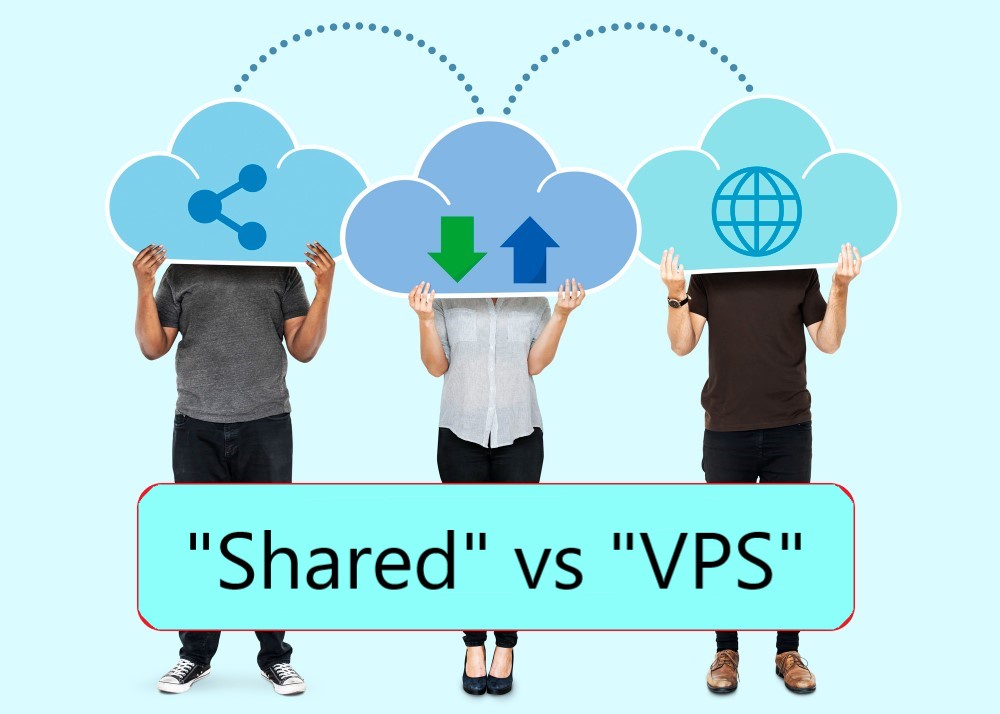'Shared Web Hosting' vs 'VPS'
Shared Web Hosting and VPS (Virtual Private Server) hosting are two different types of hosting services that cater to varying needs and requirements. Here's a comparison between Shared Hosting and VPS:
Shared Web Hosting:
- Shared hosting involves multiple websites sharing resources on a single server.
- It's a cost-effective option, usually more affordable than VPS hosting, as the server's expenses are divided among multiple users.
- Resources such as CPU, disk space, and RAM are shared among various websites hosted on the same server.
- Ideal for beginners, small websites, blogs, or those with moderate traffic.
- Limited control over server settings and configurations since resources are shared.
Pros:
- Cost-effective: Shared hosting plans are generally more affordable since the server's resources are divided among multiple users, reducing individual costs.
- Ease of Use: Ideal for beginners and those with minimal technical knowledge as the hosting provider handles server maintenance, updates, and security.
- Low Maintenance: Server management and technical issues are taken care of by the hosting provider, allowing users to focus on their websites.
- Suitable for Small Websites: Perfect for small-scale websites, blogs, or personal sites with moderate traffic levels.
- Quick Setup: Shared hosting usually offers a quick setup process, allowing users to get their websites online swiftly.
Cons:
- Resource Limitations: Limited resources (CPU, RAM, bandwidth) as they are shared among multiple websites. This can lead to performance issues during traffic spikes on other websites sharing the same server.
- Less Control: Limited control over server settings and configurations compared to VPS or dedicated hosting.
- Security Concerns: Security vulnerabilities may arise due to sharing the same server with other users. If one site encounters security issues, it may potentially affect others on the same server.
VPS (Virtual Private Server) Hosting:
- VPS hosting entails dividing a physical server into multiple virtual compartments, each acting as an independent server environment.
- Each VPS has its dedicated resources, including CPU, RAM, storage, and bandwidth, allocated separately from other virtual servers.
- Offers more control, customization, and scalability compared to shared hosting.
- Suitable for websites with fluctuating traffic, e-commerce sites, or businesses requiring more resources and control.
- Provides root access and allows users to install software and make configurations similar to a dedicated server, but at a more affordable price.
Pros:
- Dedicated Resources: Each VPS operates independently with dedicated resources (CPU, RAM, storage, bandwidth), providing better performance and reliability.
- Scalability: Allows for easy scaling of resources as per the website's needs without affecting other VPS instances on the same server.
- Enhanced Control: Provides root access, allowing users to customize server settings, install applications, and configure software based on individual preferences.
- Improved Security: Being isolated from other VPS instances on the same physical server enhances security, reducing the risk of potential security threats from neighboring sites.
- Better Performance: Offers higher performance compared to shared hosting, especially during high traffic periods.
Cons:
- Cost: VPS hosting plans are usually more expensive than shared hosting due to the dedicated resources allocated to each VPS instance.
- Technical Knowledge: Requires more technical expertise to manage and configure compared to shared hosting, as users have more control over server settings.
- Responsibility for Server Maintenance: Users are responsible for managing and maintaining their VPS, including software updates, security configurations, and troubleshooting issues.
In summary, Shared Web Hosting is a more budget-friendly option where resources are shared among multiple users, while VPS Hosting offers more control, dedicated resources, and scalability at a slightly higher cost. The choice between the two depends on factors such as website traffic, performance requirements, control, and budget constraints.
Conclusion:
Choosing between Shared Hosting and VPS depends on factors such as website traffic, performance needs, budget, technical skills, and the level of control required over the hosting environment.


No comments yet